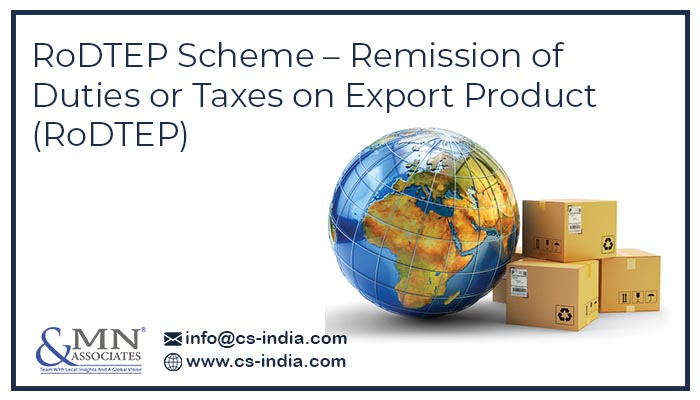
RoDTEP Scheme – Remission of Duties or Taxes on Export Product (RoDTEP)
RoDTEP Scheme – Finance Minister Nirmala Sitaraman on 14th September 2019 placed some relieving measures for uplifting growth indicators of the economy…The proposed measures suggested for simplification of compliances and easy movement of credit, along with adding some crucial policy schemes for expanding sops of exports for the country.
In furtherance of the current Merchandise Export from India Scheme (MEIS), a new scheme namely the Remission of Duties or Taxes on Export Product (RoDTEP) has been announced to further incentivize the exporters with new export options, liberal policies, and duty benefits.
About RoDTEP Scheme
The new RoDTEP scheme will get into effect from 1st, January 2020 and will be monitored by the Ministry of Finance(MoF). The scheme oath to add more revenue incentives for exporters.
Key Features of the RoDTEP Scheme:
- The scheme has been additionally allocated Rs 50,000 crores from government corpus to benefit exporters with time-bound duty refunds.
- The scheme will enclose all sector Industries including Textiles which are enjoying benefits under the MEIS scheme at 2 %, 3% or 5% of the export value.
- Like MEIS, the scheme is expected to further push exports with pace in reimbursement of taxes in sync with norms of the World Trade Organisation( WTO).
- Industries registered under the MEIS and Rebate of State Levies Scheme (RoSL) including textile will continue to avail benefits of the MEIS scheme till 1st Jan 2020 and be later shifted to RoDTEP.
Impact of RoDTEP
For the coming year, the RoDTEP scheme will positively add more incentives for the exporters. Also, the following are the benefits of the scheme:
- It will add more competitiveness to the products with assured duty benefits from the government in the foreign markets
- It will create additional pressure on the Budget, dropping the government revenue when compared to previous allocations made in MEIS.
- Being a WTO(World Trade Organisation) compliant policy, it will help exporters to meet international standards for exports and to raise a better economy for their business.
Other Incentives Announced for Export Sector
- Automated Route for ITC Refunds: For the speedier and automated processing of refunds of Input Tax Credit in GST, a special module (Form GSAT RFD-01)for the export sector was proposed. It has already been implemented from September 2019.
Details required for filling Form GSAT RFD- 01 ( For Application of Refund ):
- GST details of the entity
- Amount to be claimed, previously claimed if any;
- Details of exports made
- Details of supplies made to SEZs
- Bank Account Details of the entity
- Declaration
- Policy support to the existing ECIS scheme: Further extension support to the Export Credit Insurance Scheme (“ESIC”) through the Export Credit Guarantee Corporation (“ECGC”) has been given to enable banks with high insurance security for lending to export units.
The ECGC( the Export Credit Guarantee Corporation) is an authorized entity working under the rules and regulations of the Ministry of Commerce (MoC) for assuring credit insurance support to Indian exporters.
Role of ECGC is to :
- Insure exporters against loss incurred in exports of both goods and services.
- Offer guarantees against export transactions to banks.
- Insure Indian companies investing abroad in joint ventures.
- Digitization of export facilities: Ongoing initiatives for the exporters will be further leveraged with technology-driven procedures including export clearances, publishing of export data in real-time from 1st, Jan 2020, etc.
An Online ‘Origin Management System’ will be created to improve ease of doing business for export houses to virtually obtain their Certificate of Origin under Rules of Origin.
- Better alignment to Free Trade Agreement (“FTA”): Numerous changes in the Free Trade Agreement policies were made –
- a) to create awareness among the MSMEs for availing of duty benefits,
- b) to reduce compliance requirements for exporters and importers,
- c) for placing an effective monitoring module for FTAs.
About Free Trade Agreement
Free Trade Agreements (FTA) are agreements made on common thoughts of two countries agreeing to share trade borders. The agreements are concerned for reductions in custom tariffs and non-tariff barriers on trade.
Accepting the lead time of 3 months for MEIS, the exporters are still waiting for more updates from the department regarding enclosure of benefits under the RoDTEP scheme.
Want to apply for an export license?
Get consultation for free
Email us at info@cs-india.com
Also Read: Annual Filing of ROC Returns – Points to keep in mind
